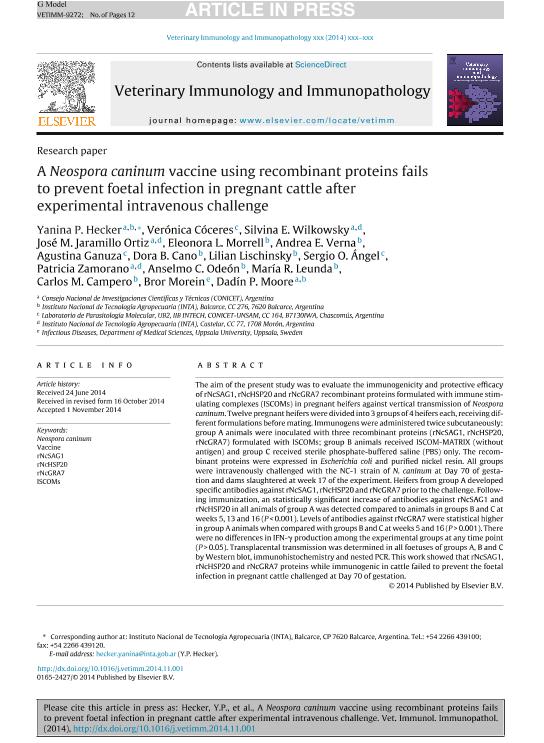Artículo
A Neospora caninum vaccine using recombinant proteins fails to prevent foetal infection in pregnant cattle after experimental intravenous challenge
Hecker, Yanina Paola ; Cóceres, Verónica Mabel
; Cóceres, Verónica Mabel ; Wilkowsky, Silvina Elizabeth
; Wilkowsky, Silvina Elizabeth ; Jaramillo Ortiz, José Manuel
; Jaramillo Ortiz, José Manuel ; Morrell, Eleonora Lidia
; Morrell, Eleonora Lidia ; Verna, Andrea Elizabeth
; Verna, Andrea Elizabeth ; Ganuza, Agustina; Cano, Dora B.; Lischinsky, Lilian; Ángel, Sergio Oscar
; Ganuza, Agustina; Cano, Dora B.; Lischinsky, Lilian; Ángel, Sergio Oscar ; Zamorano, Patricia Ines
; Zamorano, Patricia Ines ; Odeón, Anselmo Carlos; Leunda, Maria Rosa; Campero, Carlos Manuel; Morein, Bror; Moore, Dadin Prando
; Odeón, Anselmo Carlos; Leunda, Maria Rosa; Campero, Carlos Manuel; Morein, Bror; Moore, Dadin Prando
 ; Cóceres, Verónica Mabel
; Cóceres, Verónica Mabel ; Wilkowsky, Silvina Elizabeth
; Wilkowsky, Silvina Elizabeth ; Jaramillo Ortiz, José Manuel
; Jaramillo Ortiz, José Manuel ; Morrell, Eleonora Lidia
; Morrell, Eleonora Lidia ; Verna, Andrea Elizabeth
; Verna, Andrea Elizabeth ; Ganuza, Agustina; Cano, Dora B.; Lischinsky, Lilian; Ángel, Sergio Oscar
; Ganuza, Agustina; Cano, Dora B.; Lischinsky, Lilian; Ángel, Sergio Oscar ; Zamorano, Patricia Ines
; Zamorano, Patricia Ines ; Odeón, Anselmo Carlos; Leunda, Maria Rosa; Campero, Carlos Manuel; Morein, Bror; Moore, Dadin Prando
; Odeón, Anselmo Carlos; Leunda, Maria Rosa; Campero, Carlos Manuel; Morein, Bror; Moore, Dadin Prando
Fecha de publicación:
11/2014
Editorial:
Elsevier
Revista:
Veterinary Immunology And Immunopathology
ISSN:
0165-2427
Idioma:
Inglés
Tipo de recurso:
Artículo publicado
Clasificación temática:
Resumen
The aim of the present study was to evaluate the immunogenicity and protective efficacy of rNcSAG1, rNcHSP20, rNcGRA7 recombinant proteins formulated with immune stimulating complexes (ISCOMs) in pregnant heifers against vertical transmission of N. caninum. Twelve pregnant heifers were divided into 3 groups of 4 heifers each, receiving different formulations before mating. Immunogens were administered twice subcutaneously: group A animals were inoculated with three recombinant proteins (rNcSAG1, rNcHSP20, rNcGRA7) formulated with ISCOMs; group B animals received ISCOM-MATRIX (without antigen) and group C received sterile phosphate-buffered saline (PBS) only. The recombinant proteins were expressed in Escherichia coli and purified by nickel resin. All groups were intravenously challenged with the NC-1 strain of Neospora caninum at day 70 of gestation and dams slaughtered at week 17 of the experiment. Heifers from group A developed specific antibodies against rNcSAG1, rNcHSP20 and rNcGRA7 prior to the challenge. Following immunization, an statistically significant increase of antibodies against rNcSAG1 and rNcHSP20 in all animals of group A was detected compared to animals in groups B and C at weeks 5, 13 and 16 (P <0.001). Levels of antibodies against rNcGRA7 were statistical higher in group A animals when compared with groups B and C at weeks 5 and 16 (P > 0.001). There were no differences in IFN-γ production among the experimental groups at any time point (P > 0.05). Transplacental transmission was determined in all fetuses of groups A, B and C by Western Blot, Immunohistochemistry and nested PCR. This work showed that rNcSAG1, rNcHSP20 and rNcGRA7 proteins while immunogenic in cattle failed to prevent the fetal infection in pregnant cattle challenged at Day 70 of gestation.
Palabras clave:
Neospora Caninum
,
Vaccine
,
Rncsag1
,
Rnchsp20
,
Rncgra7
,
Iscoms
Archivos asociados
Licencia
Identificadores
Colecciones
Articulos(CCT - LA PLATA)
Articulos de CTRO.CIENTIFICO TECNOL.CONICET - LA PLATA
Articulos de CTRO.CIENTIFICO TECNOL.CONICET - LA PLATA
Articulos(CCT - MAR DEL PLATA)
Articulos de CTRO.CIENTIFICO TECNOL.CONICET - MAR DEL PLATA
Articulos de CTRO.CIENTIFICO TECNOL.CONICET - MAR DEL PLATA
Articulos(IIB-INTECH)
Articulos de INST.DE INVEST.BIOTECNOLOGICAS - INSTITUTO TECNOLOGICO CHASCOMUS
Articulos de INST.DE INVEST.BIOTECNOLOGICAS - INSTITUTO TECNOLOGICO CHASCOMUS
Articulos(SEDE CENTRAL)
Articulos de SEDE CENTRAL
Articulos de SEDE CENTRAL
Citación
Morrell, Eleonora Lidia; Ángel, Sergio Oscar; Ganuza, Agustina; Jaramillo Ortiz, José Manuel; Campero, Carlos Manuel; Lischinsky, Lilian; A Neospora caninum vaccine using recombinant proteins fails to prevent foetal infection in pregnant cattle after experimental intravenous challenge; Elsevier; Veterinary Immunology And Immunopathology; 162; 3-4; 11-2014; 142-153
Compartir
Altmétricas



